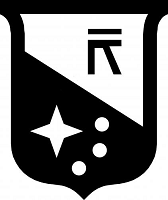Difference between revisions of "Merchant Service"
WHULorigan (talk | contribs) |
|||
| (40 intermediate revisions by 3 users not shown) | |||
| Line 1: | Line 1: | ||
[[File:Trader's_Guild-Traveller_(small).png |right]] | [[File:Trader's_Guild-Traveller_(small).png |right]] | ||
| − | The [[Merchant Service]] | + | The [[Merchant Service]] is a catch-all term for the many commercial shipping companies and related organizations that exist throughout [[Charted Space]] and beyond, whose primary activity is the transport of goods and sophonts between star systems for profit. |
| − | |||
| − | |||
| − | |||
| − | |||
| − | |||
| − | |||
| − | |||
| − | |||
| − | |||
| − | |||
| − | |||
| − | |||
| − | |||
| − | |||
| − | |||
| − | |||
| − | |||
== Description ([[Specifications]]) == | == Description ([[Specifications]]) == | ||
| + | The [[Merchant Service]]'s primary commercial activity is the transport of goods and sophonts between star systems. It facilitates interstellar trade with many merchants and trade vessels. Interstellar trade depends on the reliable and consistent ability to ship freight, cargo, and passengers from a world of origin to its destination on another world. Mercantile trade is facilitated both by large merchant lines as well as freelance traders. While some corporations may be so large that transport is merely one division of their total commercial operations, others are solely in the transportation business. | ||
| + | |||
=== Organization === | === Organization === | ||
==== The Merchant Service Academy ==== | ==== The Merchant Service Academy ==== | ||
| Line 26: | Line 11: | ||
''Merchant Service Academy'' graduates are known as "Licensed Officers" as opposed to "Commissioned Officers", and qualify to take up a position as a licensed officer in either the deck department or engineering department of a merchant vessel. The ''Merchant Service Academy'' also sees to the certification of merchant pursers as well as the preliminary service training of individuals intending to attend medical school in order to take up the position of ship's doctor. | ''Merchant Service Academy'' graduates are known as "Licensed Officers" as opposed to "Commissioned Officers", and qualify to take up a position as a licensed officer in either the deck department or engineering department of a merchant vessel. The ''Merchant Service Academy'' also sees to the certification of merchant pursers as well as the preliminary service training of individuals intending to attend medical school in order to take up the position of ship's doctor. | ||
| − | ''Merchant Service Academy'' graduates may also receive a reserve commission as an ensign in a Naval Reserve service, which may be activated during wartime. In such cases, a merchant officer's Naval Reserve Officer rank will correspond to the equivalent merchant officer service rank currently held. | + | ''Merchant Service Academy'' graduates may also receive a reserve commission as an ensign in a Naval Reserve [[Colonial Navy]] service, which may be activated during wartime. In such cases, a merchant officer's Naval Reserve Officer rank will correspond to the equivalent merchant officer service rank currently held. |
=== Departments & Rank Structure === | === Departments & Rank Structure === | ||
==== Shipboard Departments ==== | ==== Shipboard Departments ==== | ||
| − | Merchant crew are divided between those who have simply joined up with the Merchant Service and have received ordinary rank as crewmen, and those who have gone through college or the ''Merchant Service Academy'' and have been licensed as ''Merchant Service Officers''. Both officers and crew in the Merchant Service will be assigned to one of three principle shipboard departments based on their specific background and initial training: the ''Deck Department'', the ''Engineering Department'', or the ''Support Department''. Note that crew with ordinary rank are known officially only by their department and number of terms served (which is the same as their their pay-grade: e.g. Engineer E4, Deck E2, etc). Nevertheless, unofficial terms for crew rank have arisen in common parlance, and are shown in the tables below. | + | Merchant crew are divided between those who have simply joined up with the Merchant Service and have received ordinary rank as crewmen, and those who have gone through college or the ''Merchant Service Academy'' and have been licensed as ''Merchant Service Officers''. Both officers and crew in the Merchant Service will be assigned to one of three principle shipboard departments based on their specific background and initial training: the ''Deck Department'', the ''Engineering Department'', or the ''Support Department''. Note that crew with ordinary rank are known officially only by their department and number of terms served (which is the same as their their pay-grade: e.g. Engineer-grade E4, Deck-grade E2, etc). Nevertheless, unofficial terms for crew rank have arisen in common parlance, and are shown in the tables below. |
{|class="wikitable" style="width: 26em; text-align: left; font-size: 95%" | {|class="wikitable" style="width: 26em; text-align: left; font-size: 95%" | ||
| Line 36: | Line 21: | ||
! colspan="2" style="font-size: larger; background: #ddd;" |Merchant Ranks | ! colspan="2" style="font-size: larger; background: #ddd;" |Merchant Ranks | ||
|- | |- | ||
| − | ! | + | !Deck Department |
|- | |- | ||
!Licensed Officer | !Licensed Officer | ||
|- | |- | ||
| − | |O7 » | + | |O7 » Line Commodore |
|- | |- | ||
| − | |O6 » | + | |O6 » Senior Captain <small>(Unlimited Master's License)</small> |
|- | |- | ||
| − | |O5 » | + | |O5 » Captain <small>(Limited Master's License)</small> |
|- | |- | ||
| − | |O4 » | + | |O4 » First Officer |
|- | |- | ||
| − | |O3 » First | + | |O3 » Second Officer (First Lieutenant) |
|- | |- | ||
| − | |O2 » Second | + | |O2 » Third Officer (Second Lieutenant) |
|- | |- | ||
| − | |O1 » Third | + | |O1 » Fourth Officer (Third Lieutenant) |
|- | |- | ||
| − | |O0 » | + | |O0 » Bosun - OR - Cadet/Apprentice |
|- | |- | ||
!Ordinary Rank (Enlisted Rating) | !Ordinary Rank (Enlisted Rating) | ||
|- | |- | ||
| − | |E4 » | + | |E4 » Bosun's Mate |
|- | |- | ||
| − | |E3 » Able | + | |E3 » Able Deck Hand |
|- | |- | ||
| − | |E2 » | + | |E2 » Deck Hand |
|- | |- | ||
| − | |E1 » | + | |E1 » Deck Hand Apprentice |
|} | |} | ||
| Line 71: | Line 56: | ||
! colspan="2" style="font-size: larger; background: #ddd;" |Merchant Ranks | ! colspan="2" style="font-size: larger; background: #ddd;" |Merchant Ranks | ||
|- | |- | ||
| − | ! | + | !Engineering Department |
|- | |- | ||
!Licensed Officer | !Licensed Officer | ||
|- | |- | ||
| − | |O7 » | + | |O7 » ------------- |
|- | |- | ||
| − | |O6 » | + | |O6 » ------------- |
|- | |- | ||
| − | |O5 » | + | |O5 » ------------- |
|- | |- | ||
| − | |O4 » | + | |O4 » Chief Engineer |
|- | |- | ||
| − | |O3 » | + | |O3 » First Engineer |
|- | |- | ||
| − | |O2 » | + | |O2 » Second Engineer |
|- | |- | ||
| − | |O1 » | + | |O1 » Third Engineer |
|- | |- | ||
| − | |O0 » | + | |O0 » Engine Cadet - OR - Junior Engineer (QMED) |
|- | |- | ||
!Ordinary Rank (Enlisted Rating) | !Ordinary Rank (Enlisted Rating) | ||
|- | |- | ||
| − | |E4 » | + | |E4 » Engineer's Mate (QMED) |
|- | |- | ||
| − | |E3 » Able | + | |E3 » Able Drive Hand |
|- | |- | ||
| − | |E2 » | + | |E2 » Drive Hand |
|- | |- | ||
| − | |E1 » | + | |E1 » Drive Hand Apprentice |
|} | |} | ||
| Line 220: | Line 205: | ||
|} | |} | ||
| − | [[Free Trader]]s tend to be small privately owned vessels who, unlike the larger liners and freighters operated by the various merchant lines on regular routes to important (and lucrative) worlds, ply unscheduled routes looking for trade opportunities wherever they might be found. Because Free Traders tend to be in the 100-600 dton range, their crews tend to be much smaller than those found on the larger vessels operated by the major merchant lines. As a consequence, all of the crew will generally be found as part of a single "department", and will typically be responsible for all facets of the vessel's operation. | + | [[Free Trader]]s (see "''unscheduled service''" below) tend to be small privately owned vessels who, unlike the larger liners and freighters operated by the various merchant lines on regular routes to important (and lucrative) worlds, ply unscheduled routes looking for trade opportunities wherever they might be found. Because Free Traders tend to be in the 100-600 dton range, their crews tend to be much smaller than those found on the larger vessels operated by the major merchant lines. As a consequence, all of the crew will generally be found as part of a single "department", and will typically be responsible for all facets of the vessel's operation. |
As privately owned merchant vessels, free traders will typically be found anywhere that a profit can be made. Usually this means free traders will be more often found plying the backwater worlds of a subsector or border region where they hope to find opportunities for trade that might otherwise be overlooked or uneconomical for the big merchant lines to exploit. The life of a free trader is often hand-to-mouth, as there is no guarantee of profit, but only the hope that the next port-of-call will present an opportunity to "buy low" and/or "sell high". As a result, a free trader captain must have a keen eye for a potential deal, considering the price at which he can buy a cargo relative to what price at which he can sell it at some nearby port in another star system. | As privately owned merchant vessels, free traders will typically be found anywhere that a profit can be made. Usually this means free traders will be more often found plying the backwater worlds of a subsector or border region where they hope to find opportunities for trade that might otherwise be overlooked or uneconomical for the big merchant lines to exploit. The life of a free trader is often hand-to-mouth, as there is no guarantee of profit, but only the hope that the next port-of-call will present an opportunity to "buy low" and/or "sell high". As a result, a free trader captain must have a keen eye for a potential deal, considering the price at which he can buy a cargo relative to what price at which he can sell it at some nearby port in another star system. | ||
| + | |||
| + | === Vessels and Operations === | ||
| + | The particular activities and missions of various merchant vessels and their crews are designated both within the Merchant Service and by Imperial tradition according to a generally consistent set of terminology. Merchant vessels are further identified by whether or not they provide regular service along established trade routes (i.e. "''scheduled service''") which is often subsidized by local governments, or whether they operate freely at the discretion and direction of their individual ship masters or owners (i.e. "''unscheduled service''" or "''tramp service''"). | ||
| + | |||
| + | The primary mission of a merchant vessel will generally fall into one of three categories: | ||
| + | |||
| + | * '''Freight Service'''. ''Freight'' is defined as goods that are transported by a merchant vessel for a fee, but which are owned by the one shipping or receiving the goods. Vessels primarily engaged in Freight Service are known as ''Freighters'' if they run scheduled routes, and are known as ''Transports'' if they operate at the discretion of their captains or owners on no set schedule or route. Note that such vessels may also carry some passengers or cargo as well, but that is not their primary mission. | ||
| + | |||
| + | * '''Cargo Service'''. ''Cargo'' is defined as goods that are purchased and owned by the merchant vessel or its owner (i.e. the Captain and/or Chief Purser has purchased the goods via the ship's accounts) in the hope of engaging in "''speculative trade''" (i.e. buying merchandise at a particular price on one world and selling it on another world for a price hopefully higher than the price at which it was purchased on the originating world). Vessels primarily engaged in Cargo Service are known as ''Merchants'' if they run scheduled routes, and are known as ''Traders'' if they operate at the discretion of their captains or owners on no set schedule or route. Note that such vessels may also carry some passengers or freight as well, but that is not their primary mission. | ||
| + | |||
| + | * '''Passenger Service'''. ''Passenger vessels'' primarily transport sophonts and small parcels for a fee. Vessels primarily engaged in Passenger Service are known as ''Liners'' if they run scheduled routes, and are known as ''Packets'' or ''Packet Ships'' if they operate at the discretion of their captains or owners on no set schedule or route. ''Packet ships'' often provide priority transport for sophonts off main routes thru backwaters, frontiers and less settled space, and engage in the transport of high-value/high-priority parcels to similar destinations. Note that such vessels may also carry some freight or cargo as well, but that is not their primary mission. Packet ships that are armed and/or fast are sometimes employed illicitly in interdicted areas as "''Blockade Runners''". | ||
| + | |||
| + | ==== Image Repository ==== | ||
| + | Some examples of various classes of merchant vessels active in Imperial space are shown below. | ||
| + | |||
| + | * Type-A [[Trader]]s: <br> [[File:Free-Trader-T5-Core-Rules-Pg-358 25-July-2018a.jpg |150px]] [[File:Type A Free Trader Alt.png|200px]] [[File:Far-Trader-T5-Core-Rules-Pg-358 25-July-2018a.jpg |120px]] | ||
| + | <br> | ||
| + | * Type-R [[Subsidized Merchant]]s: <br> [[File:Ghent-Sub-Merchant-RESIZE-S-Venters Spin-Mar-Campaign-COVER 31-July-2019c.jpg|200px|]] [[File:Type A Free Trader.jpeg |250px|]] [[File:Sub-Merchant-WH-Keith-MT-Imp-Encyclo-Pg-36 03-July-2018a.jpg|200px]] | ||
| + | <br> | ||
| + | * Type U Armed [[Packet]]: <br> [[File:Armed-Packet-Ship-T5-Ian-Stead 31-May-2019a.jpg|200px]] [[File:Armed-Packet-T5-Core-Rules-FFE 29-May-2019a.png|175px]] | ||
| + | <br> | ||
| + | * Type-M [[Subsidized Liner]] and Type-RT [[Longliner]]: <br> [[File:Sub-Liner-WH-Keith-MT-Imp-Encyclo-Pg-36 03-July-2018a.jpg|200px]] [[File:Tukera-LongLiner-RESIZE-The-Trav-Adventure-W-Keith 24-Aug-2019b.jpg|175px]] | ||
| + | <br> | ||
| + | * Type-F [[Freighter]]s and Type-T [[Transport]]s: <br> [[File:Borazio-Hvy-Freighter-MGT-RESIZE-Core-Rulebook-pg-124 12-Oct-2019b.jpg|250px]] [[File:Type-TI-F-Transport-MT-RESIZE-Rob-Caswell-Reb-Sourcebook-pg-84 27-Sept-2019c.jpg|200px]] [[File:Hercules class Cargo Transport TTAdv.jpg|175px]] [[File:Tukera-LongLiner-RESIZE-The-Trav-Adventure-W-Keith 24-Aug-2019b.jpg|175px]] | ||
| + | <br> | ||
== History & Background ([[Dossier]]) == | == History & Background ([[Dossier]]) == | ||
| Line 253: | Line 263: | ||
* Interface | * Interface | ||
* Fledgling | * Fledgling | ||
| − | |||
| − | |||
| − | |||
| − | |||
| − | |||
===== Subsector Lines ===== | ===== Subsector Lines ===== | ||
| Line 268: | Line 273: | ||
Those who are beginners at interstellar trade and transport are called fledgling lines. Some are free traders who have been able to make some money which has been subsequently invested in additional ships. Others are veterans of larger lines who have since gone into business for themselves. Yet others are partnerships of several independent ship owners who have banded together to create a merchant line. A few are just businessmen who were lucky enough to be awarded a merchant subsidy and are now trying to make it turn a profit. Nine out of ten fledgling lines fail within the first five years. Of those remaining, nine out of ten barely break even. The one out of a hundred that remains, however, eventually moves up to become an interface line or perhaps as a subsector-wide line. Fledgling lines are the most common lines, the most risky, and have the greatest potential, however slim the chance of success. | Those who are beginners at interstellar trade and transport are called fledgling lines. Some are free traders who have been able to make some money which has been subsequently invested in additional ships. Others are veterans of larger lines who have since gone into business for themselves. Yet others are partnerships of several independent ship owners who have banded together to create a merchant line. A few are just businessmen who were lucky enough to be awarded a merchant subsidy and are now trying to make it turn a profit. Nine out of ten fledgling lines fail within the first five years. Of those remaining, nine out of ten barely break even. The one out of a hundred that remains, however, eventually moves up to become an interface line or perhaps as a subsector-wide line. Fledgling lines are the most common lines, the most risky, and have the greatest potential, however slim the chance of success. | ||
| − | ---- | + | ---- |
=== Free Traders === | === Free Traders === | ||
Free Traders operate wandering tramp trade vessels that visit worlds on irregular schedules. Free Traders serve the worlds that other merchants do not. Operating without schedules, they take the chance that the next world they visit will provide a full cargo hold and ample passengers. While this ideal is not often achieved, the chances taken by Free Traders can sometimes pay off. Worlds ignored by the larger merchant lines can often accumulate cargoes waiting for a ship to call, and sometimes they create lucrative, but temporary, markets. | Free Traders operate wandering tramp trade vessels that visit worlds on irregular schedules. Free Traders serve the worlds that other merchants do not. Operating without schedules, they take the chance that the next world they visit will provide a full cargo hold and ample passengers. While this ideal is not often achieved, the chances taken by Free Traders can sometimes pay off. Worlds ignored by the larger merchant lines can often accumulate cargoes waiting for a ship to call, and sometimes they create lucrative, but temporary, markets. | ||
| + | |||
| + | * '''Free Trader (Vessels Types)''' | ||
| + | ** [[Free Trader]] (Jump: J-1) | ||
| + | ** [[Far Trader]] (Jump: J-2+) | ||
| + | ** [[Fat Trader]] (Enhanced cargo capacity / Jump: J-1) | ||
| + | ** [[Long Trader]] (Jump: J-3+) | ||
| + | ** [[Deep Trader]] (Jump: 2×J-2+) | ||
| + | ** [[Fast Trader]] (Maneuver: M-3+) | ||
| + | ** [[Frontier Trader]] (Enhanced survivability / Jump: J-3) | ||
| + | |||
| + | ---- | ||
| + | |||
| + | == See also == | ||
| + | === Library Data Referral Tree === | ||
| + | Please refer to the following [[AAB]] [[Library Data]] for more information: <br> | ||
| + | * [[Interstellar Commerce]] | ||
| + | ** [[Merchant]] | ||
| + | ** Galactic Stock Exchange | ||
| + | ** [[Imperial Currency|Interstellar Currency]] | ||
| + | ** Interstellar Banking | ||
| + | ** [[Resource Unit]]s | ||
| + | ** [[UWP]] | ||
| + | * [[Corporation|Business Entities]] | ||
| + | ** [[Cartel]]s | ||
| + | ** [[Corporation]] | ||
| + | ** [[Megacorporation]] | ||
| + | ** [[Merchant Line]] | ||
| + | ** [[Merchant Service]] | ||
| + | ** [[Trade Organization]]s | ||
== References & Contributors ([[Sources]]) == | == References & Contributors ([[Sources]]) == | ||
| Line 282: | Line 316: | ||
|S6= [[GURPS Traveller]]: [[GURPS Traveller: Far Trader|Far Trader]] | |S6= [[GURPS Traveller]]: [[GURPS Traveller: Far Trader|Far Trader]] | ||
|S7= [[T5 Core Rules]] | |S7= [[T5 Core Rules]] | ||
| − | |S8= [[ | + | |S8= See [[Talk:Merchant_Service|Discussion Tab]] for additional External Links |
| − | |S9= | + | |S9= Compiler & Contributor: [[User:WHULorigan|WHULorigan]] |
| + | |S10= Contributor: Lord (Marquis) and Master of Sophontology [[Maksim-Smelchak]] of the [[Ministry of Science]] | ||
}} | }} | ||
Latest revision as of 13:25, 4 August 2023
The Merchant Service is a catch-all term for the many commercial shipping companies and related organizations that exist throughout Charted Space and beyond, whose primary activity is the transport of goods and sophonts between star systems for profit.
Description (Specifications)[edit]
The Merchant Service's primary commercial activity is the transport of goods and sophonts between star systems. It facilitates interstellar trade with many merchants and trade vessels. Interstellar trade depends on the reliable and consistent ability to ship freight, cargo, and passengers from a world of origin to its destination on another world. Mercantile trade is facilitated both by large merchant lines as well as freelance traders. While some corporations may be so large that transport is merely one division of their total commercial operations, others are solely in the transportation business.
Organization[edit]
The Merchant Service Academy[edit]
Much as militaries and navies maintain academies for the training of their officers, large merchant corporations (megacorporations or sector-wide lines) draw the officers for the crews of their merchant vessels from graduates of Merchant Service Academies. Cadets are trained in engineering, navigation, ship's administration, law, personnel management, customs, and various other subjects necessary to run a merchant ship.
Merchant Service Academy graduates are known as "Licensed Officers" as opposed to "Commissioned Officers", and qualify to take up a position as a licensed officer in either the deck department or engineering department of a merchant vessel. The Merchant Service Academy also sees to the certification of merchant pursers as well as the preliminary service training of individuals intending to attend medical school in order to take up the position of ship's doctor.
Merchant Service Academy graduates may also receive a reserve commission as an ensign in a Naval Reserve Colonial Navy service, which may be activated during wartime. In such cases, a merchant officer's Naval Reserve Officer rank will correspond to the equivalent merchant officer service rank currently held.
Departments & Rank Structure[edit]
Shipboard Departments[edit]
Merchant crew are divided between those who have simply joined up with the Merchant Service and have received ordinary rank as crewmen, and those who have gone through college or the Merchant Service Academy and have been licensed as Merchant Service Officers. Both officers and crew in the Merchant Service will be assigned to one of three principle shipboard departments based on their specific background and initial training: the Deck Department, the Engineering Department, or the Support Department. Note that crew with ordinary rank are known officially only by their department and number of terms served (which is the same as their their pay-grade: e.g. Engineer-grade E4, Deck-grade E2, etc). Nevertheless, unofficial terms for crew rank have arisen in common parlance, and are shown in the tables below.
| Merchant Ranks | |
|---|---|
| Deck Department | |
| Licensed Officer | |
| O7 » Line Commodore | |
| O6 » Senior Captain (Unlimited Master's License) | |
| O5 » Captain (Limited Master's License) | |
| O4 » First Officer | |
| O3 » Second Officer (First Lieutenant) | |
| O2 » Third Officer (Second Lieutenant) | |
| O1 » Fourth Officer (Third Lieutenant) | |
| O0 » Bosun - OR - Cadet/Apprentice | |
| Ordinary Rank (Enlisted Rating) | |
| E4 » Bosun's Mate | |
| E3 » Able Deck Hand | |
| E2 » Deck Hand | |
| E1 » Deck Hand Apprentice | |
| Merchant Ranks | |
|---|---|
| Engineering Department | |
| Licensed Officer | |
| O7 » ------------- | |
| O6 » ------------- | |
| O5 » ------------- | |
| O4 » Chief Engineer | |
| O3 » First Engineer | |
| O2 » Second Engineer | |
| O1 » Third Engineer | |
| O0 » Engine Cadet - OR - Junior Engineer (QMED) | |
| Ordinary Rank (Enlisted Rating) | |
| E4 » Engineer's Mate (QMED) | |
| E3 » Able Drive Hand | |
| E2 » Drive Hand | |
| E1 » Drive Hand Apprentice | |
| Merchant Ranks | |
|---|---|
| Support Department | |
| Certified Officer | |
| O7 » ------------- | |
| O6 » ------------- | |
| O5 » ------------- | |
| O4 » Chief Purser | |
| O3 » Purser / Medic | |
| O2 » Asst. Purser / Asst. Medic | |
| O1 » Junior Purser | |
| O0 » Steward / Surgeon's Mate | |
| Ordinary Rank (Enlisted Rating) | |
| E4 » Steward's Mate / Surgeon's Steward | |
| E3 » Able Crew-Hand | |
| E2 » Crew-Hand | |
| E1 » Crew-Hand Apprentice | |
Deck Department
- The Deck Department on a merchant vessel is responsible for operating and navigating the ship. The Deck Department is headed by the First Officer.
- When on duty, the personnel of the Deck Department are generally found at their duty stations on the ship's bridge when it is under way. In addition to being the line through which command of the ship devolves, each of the deck officers has the responsibility of being the "Officer of the Deck" and overseeing one of the three watches on the ship's bridge while underway. Larger vessels will be commanded by a Senior Captain (O6) assisted by a First Officer of rank O4. The duty of Officer of the Deck will be rotated through the First through Third Officers (ranks O4 through O2) on such vessels. Smaller vessels will be commanded by a Captain of rank O5, and in some cases will only have subordinate deck officers of ranks O1 through O3.
- Merchant Cadets who have been assigned to a vessel are often called "Apprentices", while crewman who have taken and passed their deck-qualification exams, but for whom no deck department officer position is open, are often appointed to the position of Bosun as a Qualified Member of the Deck Department ("QMDD").
Engineering Department
- The Engineering Department on a merchant vessel is responsible for operating and maintaining the engineering spaces and drives aboard the ship. The Engineering Department is headed by the Chief Engineer. Members of the engineering department are typically composed of engineers, mechanics, and technicians.
- The Chief Engineer is assisted by three Assistant Engineers of rank O1 though O3, each of whom oversees one of the three engineering watches while the ship is underway. Typically each of the three Assistant Engineers will also be personally responsible for overseeing the maintenance of one of the ships main drives (power plant, maneuver drive, and jump drive).
- Crew who have passed their qualifications for the position of engineer, but for whom no current assistant engineer position is available on a ship, are often referred to (officially) as a Qualified Member of the Engineering Department (QMED), and are assigned a position as a Junior Engineer.
Support Department
- The Support Department (also sometimes called the Steward's or Purser's Department) is responsible for overseeing the needs of the crew, passengers, and cargo aboard the vessel, as well as overseeing supplies and the ship's accounts. The Support Department is likewise responsible for obtaining, loading, caring for, and discharging both cargo and passengers. The Support Department includes the ships stewards and cooks who provide not only the provisions and food for the passengers and crew, but also see to laundry needs, entertainment, and the general comfort of both passengers and crew. The Support Department likewise oversees the ships medical personnel. The department head is variously called the "Chief Steward", "Chief Purser", or "Cargomaster".
Shore Departments[edit]
| Merchant Ranks | |
|---|---|
| Administration Department | |
| O4 » Station Head | |
| O3 » Asst. Station Head | |
| O2 » Manager | |
| O1 » Asst. Manager | |
| O0 » Clerk | |
| Merchant Ranks | |
|---|---|
| Sales Department | |
| O4 » Senior Broker | |
| O3 » Broker | |
| O2 » Asst. Broker | |
| O1 » Clerk | |
| O0 » Apprentice | |
Administration Department
- The Administration Department oversees a merchant company's interests on a particular world. The Administration Department for a merchant line will oversee the general support of its merchant fleet, including general upkeep and maintenance, fuel, crew pay, banking, mail, and medical care. As a result, the members of the department typically consist of both managers and attorneys for the company's legal needs.
Sales Department
- The primary responsibility of the Sales Department of a shipping company is the obtaining and disposing of cargoes and passengers. It is the goal of the sales department to see to it that there is sufficient cargo waiting to be loaded aboard an inbound vessel to fill its cargo hold, and also to be able to sell the unloaded cargo the vessel was carrying at a good profit. The Sales Department is likewise responsible for advertising and dealing with both freight and passenger agents. Employees of the Sales Department are typically brokers.
Free Traders[edit]
| Merchant Ranks | |
|---|---|
| Free Trader | |
| O6 » Captain/Owner (Pilot) | |
| O5 » Captain (Pilot) | |
| O4 » First Officer (Pilot/Navigator) | |
| O3 » Second Officer (Engineer) | |
| O2 » Third Officer (SensOps/Commo) | |
| O1 » Fourth Officer (Steward / Cargomaster) | |
| O0 » Crew-Hand (Apprentice) | |
Free Traders (see "unscheduled service" below) tend to be small privately owned vessels who, unlike the larger liners and freighters operated by the various merchant lines on regular routes to important (and lucrative) worlds, ply unscheduled routes looking for trade opportunities wherever they might be found. Because Free Traders tend to be in the 100-600 dton range, their crews tend to be much smaller than those found on the larger vessels operated by the major merchant lines. As a consequence, all of the crew will generally be found as part of a single "department", and will typically be responsible for all facets of the vessel's operation.
As privately owned merchant vessels, free traders will typically be found anywhere that a profit can be made. Usually this means free traders will be more often found plying the backwater worlds of a subsector or border region where they hope to find opportunities for trade that might otherwise be overlooked or uneconomical for the big merchant lines to exploit. The life of a free trader is often hand-to-mouth, as there is no guarantee of profit, but only the hope that the next port-of-call will present an opportunity to "buy low" and/or "sell high". As a result, a free trader captain must have a keen eye for a potential deal, considering the price at which he can buy a cargo relative to what price at which he can sell it at some nearby port in another star system.
Vessels and Operations[edit]
The particular activities and missions of various merchant vessels and their crews are designated both within the Merchant Service and by Imperial tradition according to a generally consistent set of terminology. Merchant vessels are further identified by whether or not they provide regular service along established trade routes (i.e. "scheduled service") which is often subsidized by local governments, or whether they operate freely at the discretion and direction of their individual ship masters or owners (i.e. "unscheduled service" or "tramp service").
The primary mission of a merchant vessel will generally fall into one of three categories:
- Freight Service. Freight is defined as goods that are transported by a merchant vessel for a fee, but which are owned by the one shipping or receiving the goods. Vessels primarily engaged in Freight Service are known as Freighters if they run scheduled routes, and are known as Transports if they operate at the discretion of their captains or owners on no set schedule or route. Note that such vessels may also carry some passengers or cargo as well, but that is not their primary mission.
- Cargo Service. Cargo is defined as goods that are purchased and owned by the merchant vessel or its owner (i.e. the Captain and/or Chief Purser has purchased the goods via the ship's accounts) in the hope of engaging in "speculative trade" (i.e. buying merchandise at a particular price on one world and selling it on another world for a price hopefully higher than the price at which it was purchased on the originating world). Vessels primarily engaged in Cargo Service are known as Merchants if they run scheduled routes, and are known as Traders if they operate at the discretion of their captains or owners on no set schedule or route. Note that such vessels may also carry some passengers or freight as well, but that is not their primary mission.
- Passenger Service. Passenger vessels primarily transport sophonts and small parcels for a fee. Vessels primarily engaged in Passenger Service are known as Liners if they run scheduled routes, and are known as Packets or Packet Ships if they operate at the discretion of their captains or owners on no set schedule or route. Packet ships often provide priority transport for sophonts off main routes thru backwaters, frontiers and less settled space, and engage in the transport of high-value/high-priority parcels to similar destinations. Note that such vessels may also carry some freight or cargo as well, but that is not their primary mission. Packet ships that are armed and/or fast are sometimes employed illicitly in interdicted areas as "Blockade Runners".
Image Repository[edit]
Some examples of various classes of merchant vessels active in Imperial space are shown below.
- Type-A Traders:
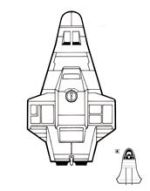
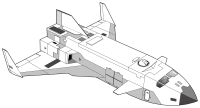
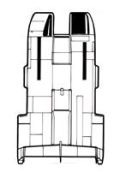
- Type-R Subsidized Merchants:
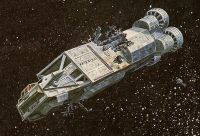
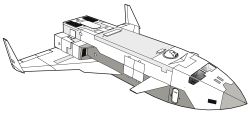
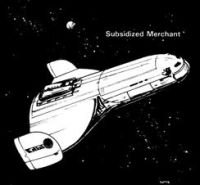
- Type U Armed Packet:

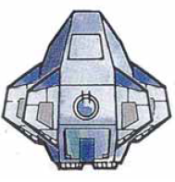
- Type-M Subsidized Liner and Type-RT Longliner:


- Type-F Freighters and Type-T Transports:
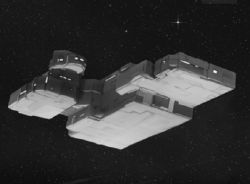
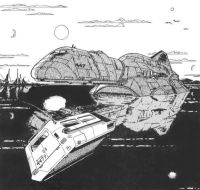
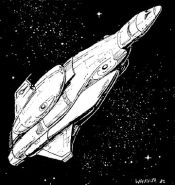

History & Background (Dossier)[edit]
The Merchant Service has been around longer than the IISS or the Starport Authority, but receives far less attention. Cleon the First probably made more use out of the Sylean predecessor to the Merchant Service than he did from his naval arm. Why the lesser name?
The Merchant Service has always been a relatively thankless job in terms of interstellar recognition, but well paid in terms of salaries and shared profits. Almost invariably, long before the Imperial Navy ever reaches a world-system, a scout or merchant has been frequenting the location for extended periods. Most merchant spacers prefer a quiet, but exciting life as a nomadic adventurer and traveller. Fame holds little over the rewards of crew camaraderie, good pay, tasty chow, and a chance to see the far corners of Charted Space.
- Please see AAB article Merchant Lines (Companies) for related information.
Merchant Lines (Types)[edit]
- Large
- Small
- Free
Large Merchant Lines[edit]
- Megacorporate
- Sector
Megacorporations[edit]
Transportation companies of Megacorporate status are the major transportation companies that operate across multiple sectors or larger distances. Only megacorporations, with their support bases and establishments spread over great distances, can provide long-distance passenger and freight service. Megacorporations often have ships with luxurious appointments and high jump capabilities, due to their large capital. Travellers can book passage for great distances on a single ship and do not need to change ships or make other successive travel arrangements for themselves.
Megacorporations usually receive the majority of the lucrative mail contracts and most of the military equipment shipment franchises from government agencies, and also carry diplomatic personnel. Megacorporations use their own equipment and available space to transport corporate personnel, often on a space available basis. Megacorporations may strike convenient reciprocal arrangements with other megacorporations for service to areas they do not serve.
Sector Lines[edit]
Sector-wide lines are large merchant lines which serve the major worlds within a sector. They are fed by subsector-wide lines, and they serve as feeders to megacorporate lines. Sector-wide lines dominate the major trade routes within a sector, and provide limited service to adjacent sectors.
Small Merchant Lines[edit]
- Subsector
- Interface
- Fledgling
Subsector Lines[edit]
Subsector-wide lines serve major worlds within a subsector, although some service may extend to systems in adjacent subsectors. On average, a subsector-wide line typically serves between one-quarter to one-third of the worlds within a subsector. The routes operated connect worlds off the main trade routes with those on the main routes. Subsector-wide lines also create their own routes connecting especially lucrative markets, and also extend their service to selected major worlds in adjacent subsectors. Subsector-wide lines serve as feeders to sector-wide lines, while they are themselves fed by fledgling lines and occasional free traders.
Interface Lines[edit]
lnterface lines provide passenger and freight service across borders from where one territory ends to where another begins. lnterface lines carefully maintain favor with both sides of the border, and provide easy transit over the line. The Vargr Extents are full of interface lines serving the many distinct Vargr territories. Interface lines operate along the Imperial border with the Aslan, K'kree, Solomani, and the Zhodani. Interface lines may serve routes either long or short. Some merely reach from a major world on one side of the border to a major world on the other side, while others operate very long trade routes many parsecs in length in order to transport goods from one territory to another.
Fledgling Lines[edit]
Those who are beginners at interstellar trade and transport are called fledgling lines. Some are free traders who have been able to make some money which has been subsequently invested in additional ships. Others are veterans of larger lines who have since gone into business for themselves. Yet others are partnerships of several independent ship owners who have banded together to create a merchant line. A few are just businessmen who were lucky enough to be awarded a merchant subsidy and are now trying to make it turn a profit. Nine out of ten fledgling lines fail within the first five years. Of those remaining, nine out of ten barely break even. The one out of a hundred that remains, however, eventually moves up to become an interface line or perhaps as a subsector-wide line. Fledgling lines are the most common lines, the most risky, and have the greatest potential, however slim the chance of success.
Free Traders[edit]
Free Traders operate wandering tramp trade vessels that visit worlds on irregular schedules. Free Traders serve the worlds that other merchants do not. Operating without schedules, they take the chance that the next world they visit will provide a full cargo hold and ample passengers. While this ideal is not often achieved, the chances taken by Free Traders can sometimes pay off. Worlds ignored by the larger merchant lines can often accumulate cargoes waiting for a ship to call, and sometimes they create lucrative, but temporary, markets.
- Free Trader (Vessels Types)
- Free Trader (Jump: J-1)
- Far Trader (Jump: J-2+)
- Fat Trader (Enhanced cargo capacity / Jump: J-1)
- Long Trader (Jump: J-3+)
- Deep Trader (Jump: 2×J-2+)
- Fast Trader (Maneuver: M-3+)
- Frontier Trader (Enhanced survivability / Jump: J-3)
See also[edit]
Library Data Referral Tree[edit]
Please refer to the following AAB Library Data for more information:
- Interstellar Commerce
- Merchant
- Galactic Stock Exchange
- Interstellar Currency
- Interstellar Banking
- Resource Units
- UWP
- Business Entities
References & Contributors (Sources)[edit]
- Classic Traveller Special Supplement 1: Merchant Prince
- Classic Traveller Book 7: Merchant Prince
- Classic Traveller Paranoia Press: Merchants & Merchandise
- MegaTraveller Player's Manual
- Mongoose Traveller: Core Rulebook
- GURPS Traveller: Far Trader
- T5 Core Rules
- See Discussion Tab for additional External Links
- Compiler & Contributor: WHULorigan
- Contributor: Lord (Marquis) and Master of Sophontology Maksim-Smelchak of the Ministry of Science
